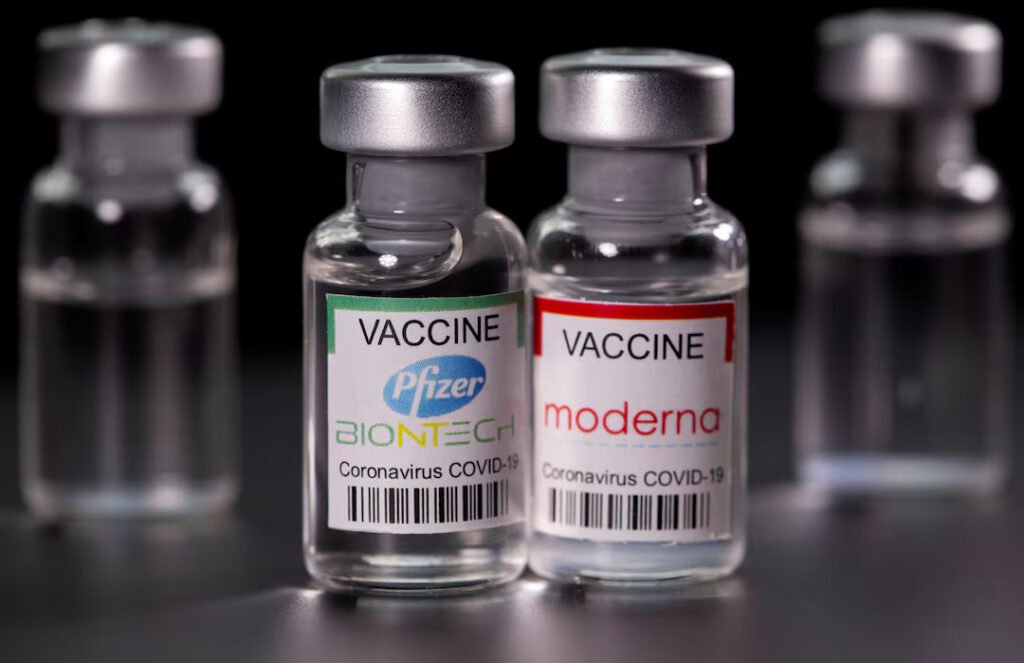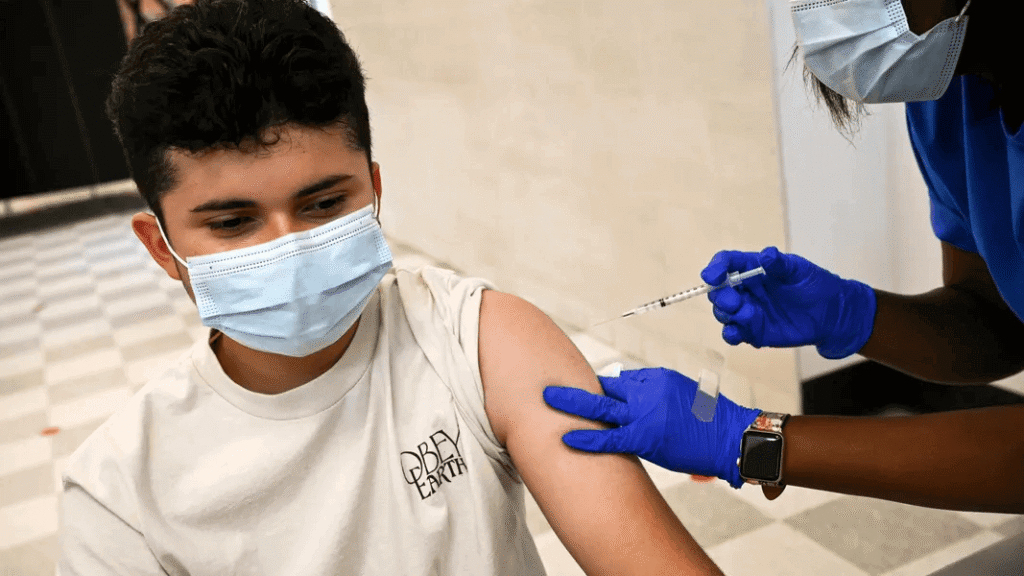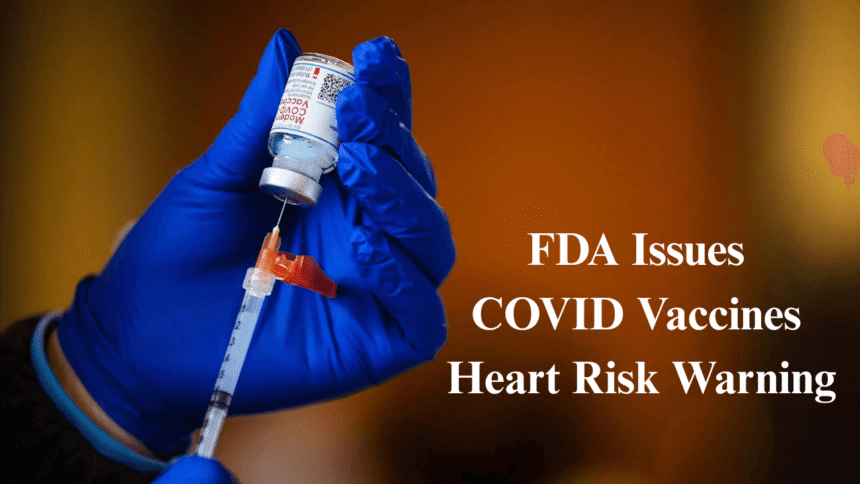The FDA has issued a new COVID vaccines heart risk warning, focusing on the increased incidence of myocarditis in young males. After evaluating new post-vaccination data and clinical imaging, federal health officials confirmed that men aged 16 to 25 are more likely to experience rare heart inflammation shortly after receiving mRNA-based COVID-19 vaccines. The updated warning reflects findings from a growing body of scientific evidence that prompted a revision of vaccine labeling.
This COVID vaccines heart risk warning applies to both Pfizer and Moderna shots, especially their 2023–2024 updated formulas. Though the risk remains rare, the frequency among young men is significantly higher than in other age groups. The FDA emphasized that most cases are mild and resolve with treatment, but the update aims to ensure greater transparency and informed consent.
What Is Myocarditis and Why the Concern?

Myocarditis is an inflammation of the heart muscle. It can cause symptoms such as chest pain, shortness of breath, and abnormal heartbeat. Although it is typically triggered by viral infections, recent vaccine surveillance has linked a small but notable number of myocarditis cases to mRNA COVID-19 vaccines.
According to recent evaluations, most of the affected individuals developed symptoms within seven days of vaccination. Young males between 16 and 25 were disproportionately affected. These new insights fueled the FDA’s decision to strengthen the COVID vaccines heart risk warning.
Doctors continue to stress that the risk of myocarditis from a COVID-19 infection remains higher than from vaccination. However, public health agencies are now taking a more personalized approach to risk communication.
What the Data Reveals
A closer look at surveillance data from 2023 through early 2025 revealed the following:
- 16–25-year-old males showed the highest rate of myocarditis, averaging 27 to 38 cases per million doses.
- Most myocarditis cases occurred after the second dose or updated booster shots.
- The majority of affected individuals recovered within a few weeks, especially with prompt medical care.
These numbers, while low overall, have influenced the FDA’s decision to issue the revised COVID vaccines heart risk warning to increase public awareness.
Clinical Imaging Confirms Risk Pattern

The FDA reviewed extensive clinical imaging, including cardiac MRIs, to assess the severity and duration of myocarditis. These tools helped confirm mild heart inflammation in young men who received mRNA vaccines.
Most patients displayed no long-term heart damage, but the consistency in imaging results highlighted a pattern that couldn’t be ignored. As a result, the FDA moved swiftly to amend the vaccine fact sheets and labeling language.
The updated guidance also recommends that healthcare providers remain alert for symptoms of myocarditis during the first week after vaccination, especially in young males.
How Doctors and Public Health Officials Are Responding
Many doctors support the FDA’s decision to enhance transparency around potential vaccine risks. They believe that timely and honest communication builds trust with the public.
Clinicians are now being encouraged to screen vaccine recipients for heart-related symptoms during post-vaccine follow-ups. If a young man experiences chest discomfort, fatigue, or rapid heartbeat within a few days of vaccination, immediate evaluation is advised.
Public health departments are also distributing new information sheets that reflect the COVID vaccines heart risk warning, ensuring recipients are informed before receiving a shot.
Risk vs. Benefit: What Parents and Patients Should Know

Health experts are not discouraging vaccination. Instead, they urge parents and young adults to weigh benefits and risks based on personal health history. The FDA maintains that mRNA vaccines continue to protect against severe COVID-19, hospitalization, and long-term complications like long COVID.
However, the COVID vaccines heart risk warning helps ensure that everyone involved in the decision-making process understands potential outcomes, even if they are rare.
Parents of teenage boys are encouraged to consult healthcare professionals before scheduling booster doses. Doctors may adjust the vaccination timeline based on individual risk assessments.
FDA Labeling and Future Monitoring
The updated warning will now be part of the official labeling for all mRNA COVID-19 vaccines distributed in the U.S. Moving forward, vaccine manufacturers are also required to submit regular updates on myocarditis-related outcomes.
Additional clinical trials are underway to determine if future versions of the vaccine can reduce this side effect. Meanwhile, long-term follow-up studies are examining heart function in affected individuals to ensure full recovery.
The COVID vaccines heart risk warning will remain in place as ongoing studies continue to shed light on the mechanisms behind post-vaccine myocarditis.
International Reactions and Comparisons
Countries like Canada and parts of Europe have also reported similar myocarditis findings, particularly among younger age groups. Some health agencies abroad adjusted vaccine recommendations for specific demographics.
The FDA’s updated stance brings the U.S. in line with several global counterparts that had already issued myocarditis advisories. These actions underscore a collective move toward data-driven adjustments in vaccine protocols.
Public Response and Misinformation Challenges
While many praised the FDA for its transparency, public health officials remain concerned about misinformation. Vaccine skeptics have used isolated risks to spread broader vaccine hesitancy, even when data supports the overall safety of immunization programs.
Officials are urging people to read scientific reports in full and to discuss vaccine decisions with qualified professionals rather than relying on social media. The goal of the COVID vaccines heart risk warning is to inform, not alarm.
Clear messaging remains crucial in maintaining public trust while acknowledging valid medical risks.
Transparency Builds Confidence
The newly issued COVID vaccines heart risk warning demonstrates the FDA’s commitment to monitoring vaccine safety with precision and honesty. By highlighting the myocarditis risk in young men, the agency empowers patients, families, and doctors to make well-informed decisions.
As science evolves, so too must public health policy. Vaccines remain one of the most powerful tools in fighting COVID-19, and thoughtful updates like these help strengthen public confidence through transparency, not fear.
Also read: Trump Nobel Peace Prize Nomination Sparks Debate Across Political Spectrum

